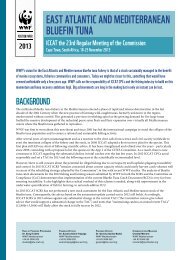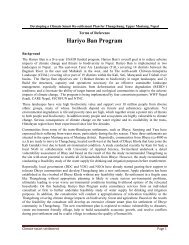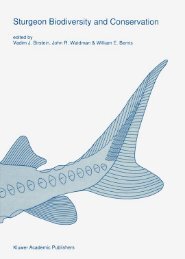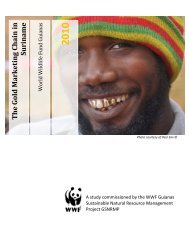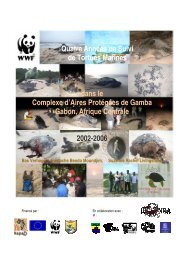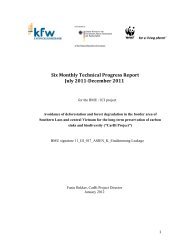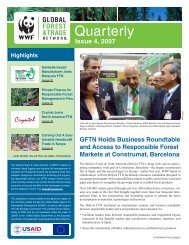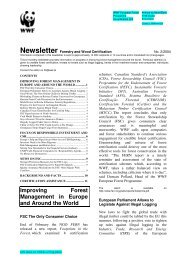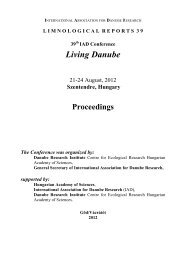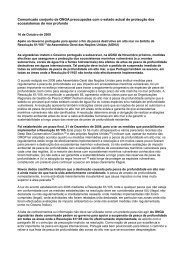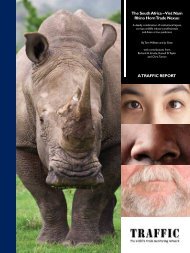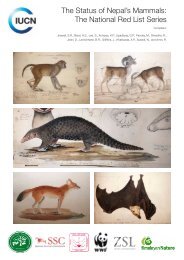SITUATION ANALYSIS OF THE SMALL-SCALE GOLD ... - WWF
SITUATION ANALYSIS OF THE SMALL-SCALE GOLD ... - WWF
SITUATION ANALYSIS OF THE SMALL-SCALE GOLD ... - WWF
Create successful ePaper yourself
Turn your PDF publications into a flip-book with our unique Google optimized e-Paper software.
Zoning of mining areas. The third intervention involves assisting the government in<br />
creating a more enabling environment in the sub-sector. It is suggested that the principle<br />
reason for zoning is to provide an organizational basis for regulating the mining regions.<br />
Better regulated regions are safer and create an enabling environment in which miners<br />
and interion communities can collaborate. Zones under effective government<br />
management will provide a context in which the miner‟s association can set up assistance<br />
schemes to promote technically, economically and environmentally sounder mineral<br />
extraction techniques. Higher recovery and productivity will result in higher incomes,<br />
allowing miners to invest in better mining equipment and develop superior mining<br />
methods, feeding an upward spiral of recovery, profits and reduced pollution.<br />
A miner who has a good year and expects to do even better the next year is a better<br />
taxpayer and more effective manager. A miner who has barely managed to get by and is<br />
uncertain about the next year will not be able to pay taxes, and is not in a position to<br />
worry about the environment and the social costs of his operation. The basic idea is to<br />
encourage and support the government in creating a viable tax base in the SSGM sector.<br />
Policy, legislative and institutional development. With a national organization of miners<br />
and the zoning of mining regions in place, the government will be in a much better<br />
position to develop a new mining policy. In fact, the work done under the first three<br />
interventions will have produced significant input from the key stakeholders that can be<br />
used to formulate a policy framework and improve the new draft mining law. The process<br />
of interactive policy making, however, should be institutionalized, as rapid changes will<br />
most certainly continue to occur in the sub-sector.<br />
With a solid policy basis, the new laws that are being drafted will be more practical and<br />
will enjoy greater support among the miners. The likelihood of compliance with the<br />
regulations will have been significantly increased. Under these circumstances it will also<br />
be easier to design and develop efficient and effective mining institution. The British<br />
Geological Survey (BGS) has already developed a full proposal for the development of a<br />
Minerals Institute and this work could be used as a point of departure in the preparation<br />
of a revised proposal.<br />
1.3 Background of the approach<br />
The approach recommended here has been inspired by the writings of the Peruvian<br />
economist Hernanado de Soto, who has formulated innovative strategies to redress the<br />
shortcomings of the “underground” or informal economies in developing countries. De<br />
Soto‟s basic thesis is that the poor in developing countries have not accumulated all the<br />
assets needed for successful capitalism. Because they are legally disenfranchised, they do<br />
not have title to the land and other assets they exploit, the poor are unable to turn these<br />
assets into liquid capital – the kind of capital that generates new wealth.<br />
De Soto argues that during the industrial revolution, the advanced nations faced the same<br />
kind of development problems that low-income countries face today. In those days the<br />
developed nations “were themselves Third World countries teeming with black markets,<br />
pervasive mafias, widespread poverty and flagrant disregard for the law.” About 150<br />
5



